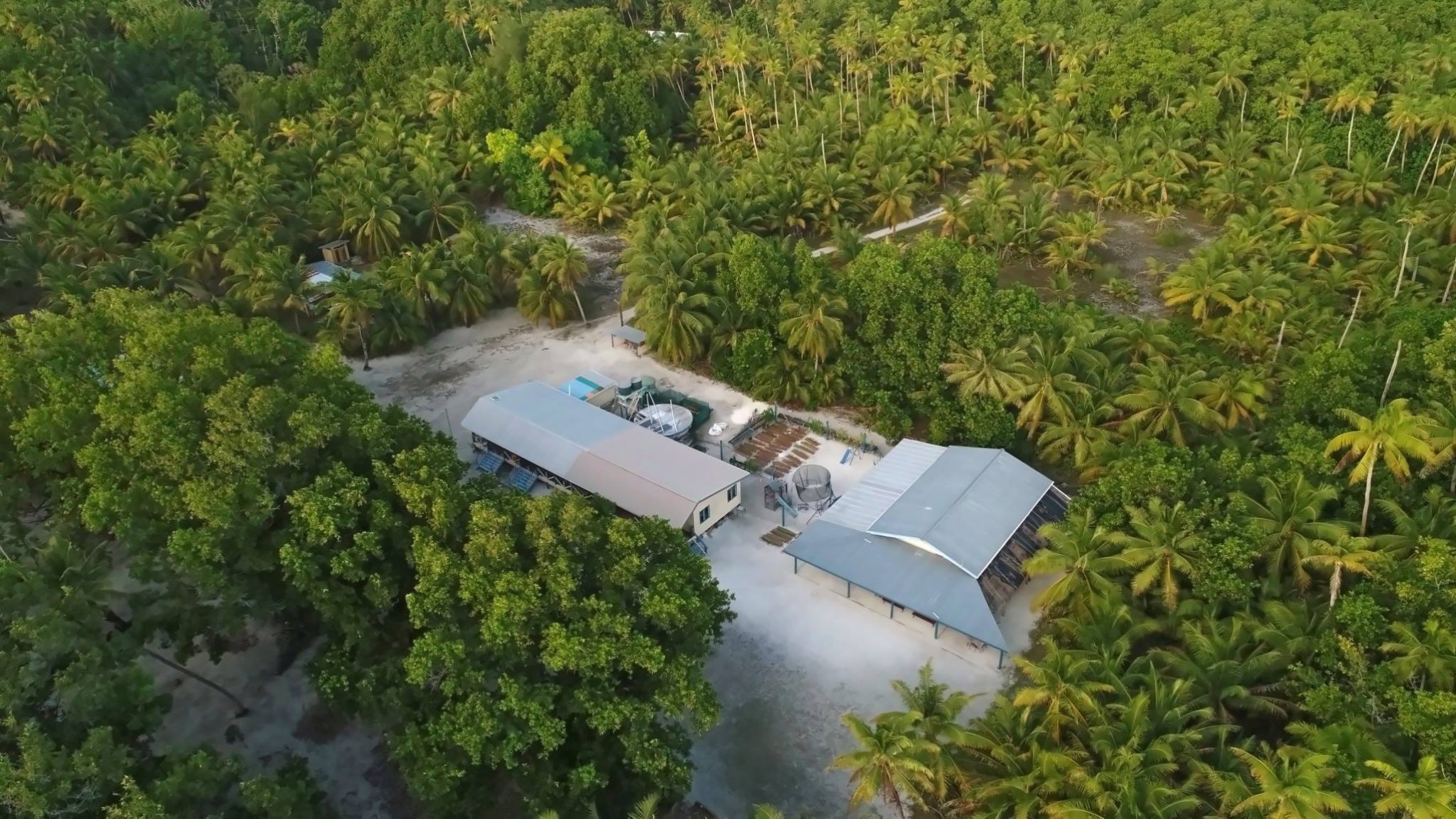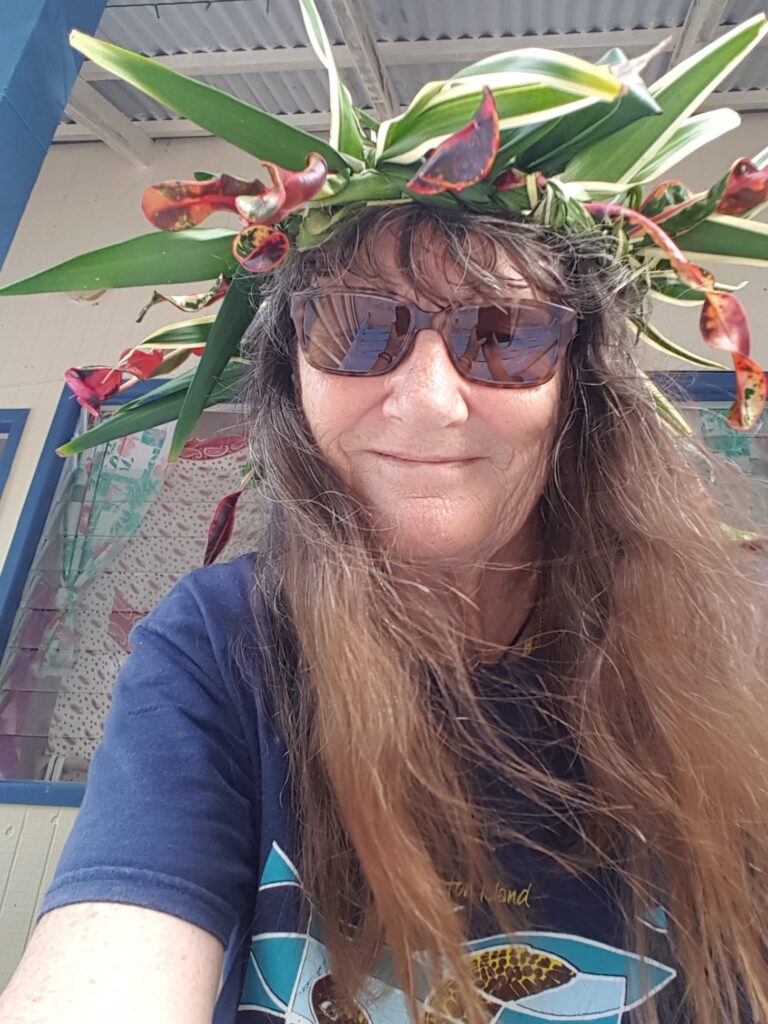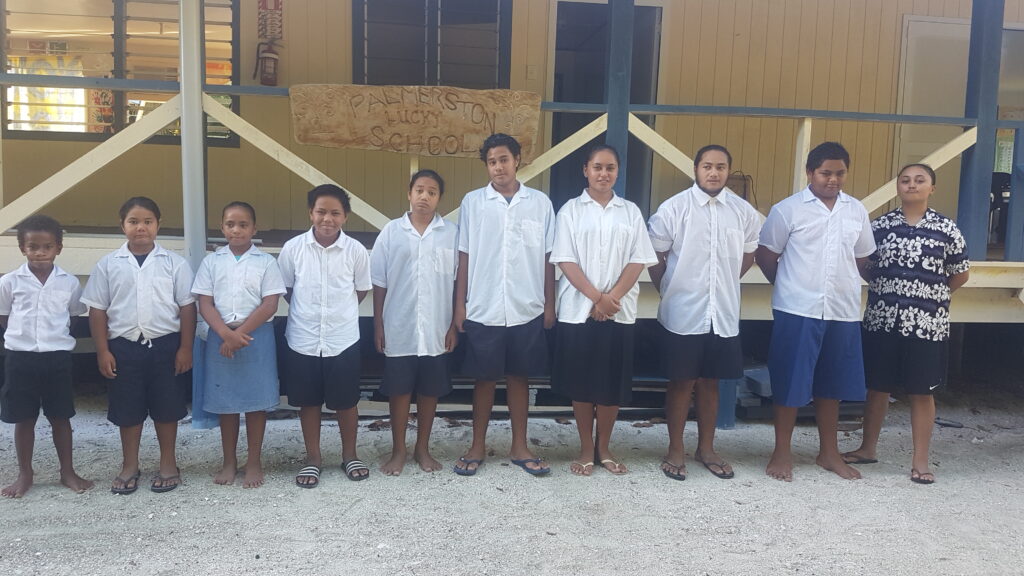Teaching at the edge of the world
Saturday 9 July 2022 | Written by Matthew Littlewood | Published in Features, Weekend

The aerial view of Palmerston Lucky School. Facebook/Atoll Story/22070814
Sherrin Hibbard will soon say goodbye to Palmerston Island Lucky School and go on another nautical adventure.
But before she does, the principal talks to senior journalist Matthew Littlewood about teaching and living on such a remote island.
Hibbard is a self-described “water baby”. The principal at Palmerston Island Lucky School still can’t believe her luck that she got to be in charge of the school back in 2018, after she had been travelling.
“I had been sailing around the Pacific, got back to Australia, and while I was looking for jobs, I saw this one,” says Hibbard.
“I knew of the corals, lagoons, Polynesian lifestyle, coconuts and limes (and thought) what’s not to like.”
Palmerston Island has about 30 inhabitants. It has no airport or airline services and takes about two days to reach from Rarotonga by boat. It also has a colourful backstory.
Although Captain Cook landed on the island in 1777, it was in 1863 that William Marsters, a ship’s carpenter and barrel maker, arrived on Palmerston from Manuae with two Polynesian wives.
He took a third wife and had a large family of some 23 children, whose descendants now inhabit Palmerston. As a result, Palmerston Island is the only island in the Cook Islands for which English is the native language.
Hibbard shares that Palmerston’s settlement and beginnings are unique in the Cook Islands.
“I see an amazing melding of Polynesian and British culture that exists nowhere else,” she explains.
Hibbard, who is an Australian, says because English was everyone’s first language, she didn’t feel too much of an outsider when she arrived on the island.
Palmerston Island Lucky School is a private school that is governed by the Palmerston Island Administration.
“Learning how things are done here was a bit of a steep learning curve though and often left me a bit confused,” she explains.
“But I am very aware that I am a visitor here – showing respect is everything.”

Hibbard shares that the early stages of her teaching were tough, as she had to combat some “pushback” from the students, but that soon dissipated after she introduced a rewards system.
The rewards system meant every student had a privilege card with six stars.
Once the students get all six stars signed, they get a “privilege”, while at the end of the year, students are able to use the stars gathered to “bid” for items such as snorkeling gear, colouring-in books, and other stuff.
“The first year, they understood the privilege system, but didn’t quite get the auction,” she explains. “But once they learned about how to bid, then they really got into it.”
She says the school’s access to learning materials, resources, and professional development can sometimes be compromised by the sheer remoteness of the island.
“If you come up with an idea and really want something, it’s not as if you go up the road and collect it. So, there’s a real need for very careful planning,” Hibbard says.
She says she’s a teacher who likes to engage in her surroundings, and having such a large sea mass surround Palmerston Island has its own advantages.
“We’re very big on literacy. We teach environmental education; the kids learn about climate change and ecology through what’s going on at the lagoon. They’re very in tune with their environment,” says Hibbard.
“Every term, the kids do a clam survey. I’m teaching them how to present their survey in a scientifically literate way. These kids are very, very close to the lagoon. Our lagoon is not as healthy as we would like it to be, but we’ve helped change the mindset of the kids. They want to protect the lagoon.”
The school’s students learn the range of the environment from food security to air miles.
“I try to link that with literacy so they can become good communicators,” Hibbard says.
“They’re helping change the ways of some of the elders on the land, who would want to capture the turtles and eat them.
“Everyone on the island is connected to the school in some way,” she adds.
The school has eight students, the youngest is five, the oldest are 17 and doing correspondence school.
“It’s a central part of the community, it’s very important to everyone. I always have high expectations of the kids, and expect them to do their best,” Hibbard says.
During her time at the school, Hibbard says she has learned patience, and has become a better teacher as a result.
“You find that students here, thanks to the internet, are already pretty clued up on trends, music, the latest dance moves or whatever, but they’re not so knowledgeable about the outside world,” she says.

“When I taught some of them how to write a letter, one of them didn’t know what a post office was. But we’re very lucky that we have access to the internet. Nowadays education is not so much about knowing facts, but about what can you do.
“So, my teaching is about skills – learning to write critically, to think differently – which they can take with them once they leave the island,” she adds.
“I’m starting to see the confidence in the kids’ writing, they’ve gained tremendously in their ability to communicate.”
Last year, each student made a short film about their clam survey and environmental studies.
“It was all of their work from start to finish, even the ukulele playing. It was a really big deal on the island, seeing these kids understand the sustainability issues and the impacts on the lagoon, they are very aware,” Hibbard says.
She also says the island was very lucky during the Covid-19 pandemic.
“The island was a very safe place. We’ve been business as usual. We’ve had no Covid-19 here, I’m still worried having to go back to the real world and deal with Covid-19. It hasn’t been an issue here,” Hibbard says.
At the end of this year, Hibbard says it will be time for a change. She shares that her plan is to spend about 18 months sailing across the Pacific, and eventually have her own boat.
“I’m particularly excited to experience the 4000 nautical miles from the Americas mainland to French Polynesia – just a small boat, the people on board and that vast empty ocean,” Hibbard says.
“I have a very deep love for the ocean and am happiest at sea, living a simple life off the grid.”
But she is in no doubt that she will miss Palmerston Island. She says she has really enjoyed the island’s remoteness.
“I like not having access to shops, not having to handle money, making our own entertainment and not having consumer goods on tap – being able to live a simple life on a small island close to nature,” she shares.
“We might be far away, and hard to get to, but the internet means I don’t feel isolated at all.
“(Also) I sure am going to miss having coconuts and limes whenever I want.”

















































